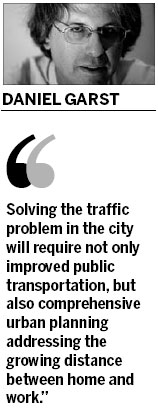Tackling the chronic traffic problem
The latest studies done by Beijing-based Horizon Research Group paint a grim picture of the capital's weekday rush hour commute. Beijingers spent an average of 62.3 minutes every day in 2009 commuting in rush hour traffic, up 7.3 minutes from 2007 (without gridlocked traffic, the average commute would be about 40 minutes). This year Beijing had about five hours of daily congestion, compared with three and a half hours in 2008. Traffic jams cost residents an average of 335.6 yuan every year, more than any other large Chinese city.

The authorities' latest solution to the city's traffic congestion is to have many public servants and employees of State-owned companies start working at 9 am. This measure will probably just prolong the rush hour. It also inconveniences parents dropping their children off at school before 8 am. The same goes for people working for information technology companies and foreign companies, who have always begun work at 9 am.
The city has also extended its license plate number based driving restrictions for two years. The last digit of the number decides which workday of the week a car is not allowed on Beijing's roads. Although this measure has eased traffic somewhat, it is also unfair, because affluent two-car families can easily get around the one-day driving ban by alternating vehicles. And the fact that many motorists do just this has certainly limited the ban's impact in reducing road congestion.















